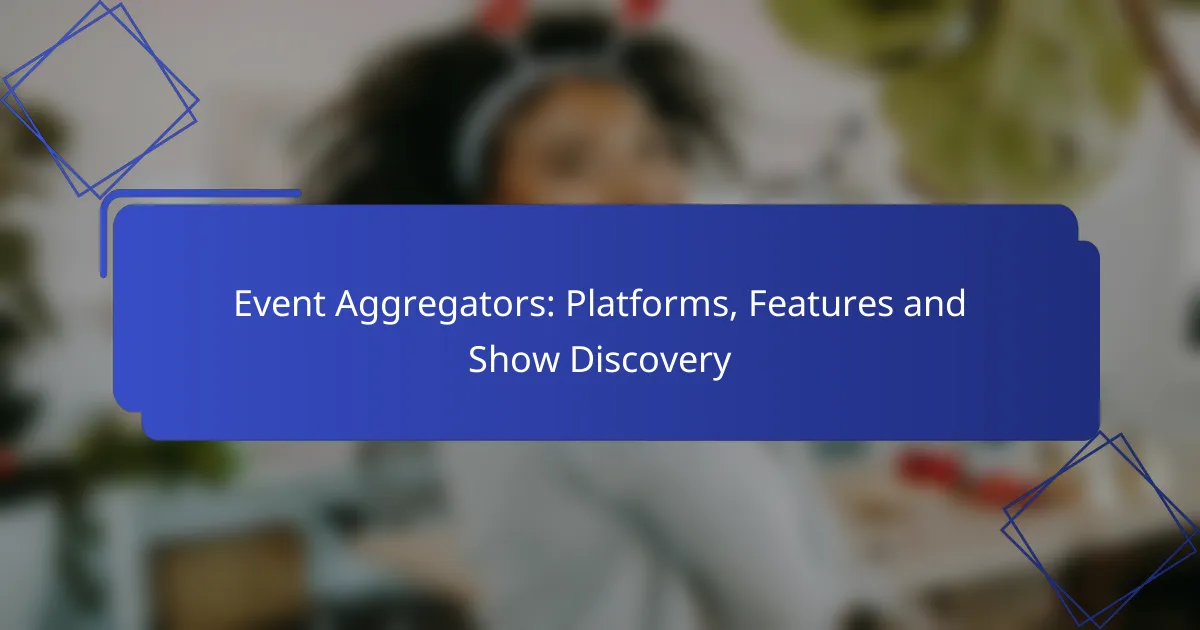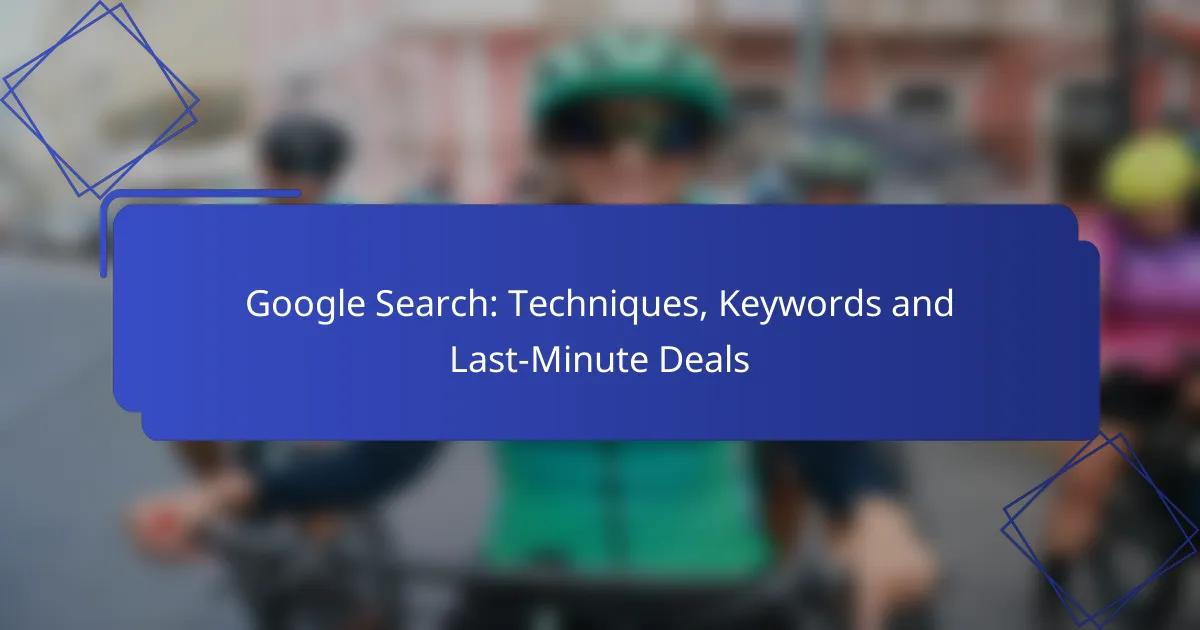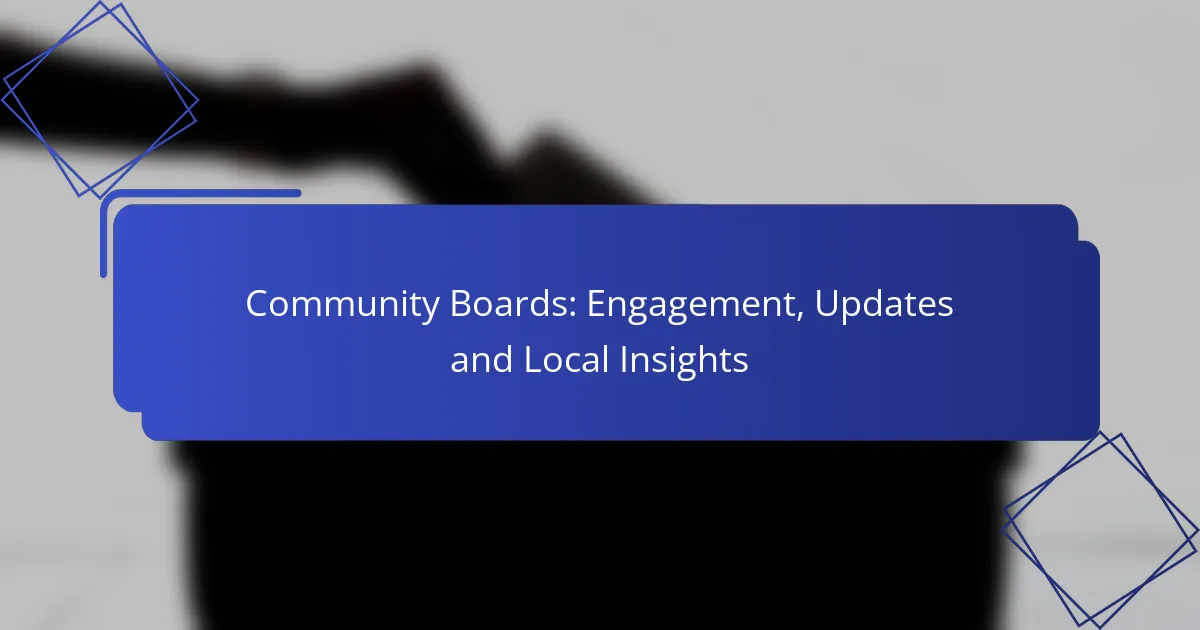Event aggregators are essential platforms that streamline the process of discovering, promoting, and managing events across diverse categories. By consolidating listings from various sources, they enhance show discovery with features like user reviews and personalized recommendations. When choosing an event aggregator, it’s important to consider features such as robust search filters, mobile accessibility, and social media integration to optimize your event experience.
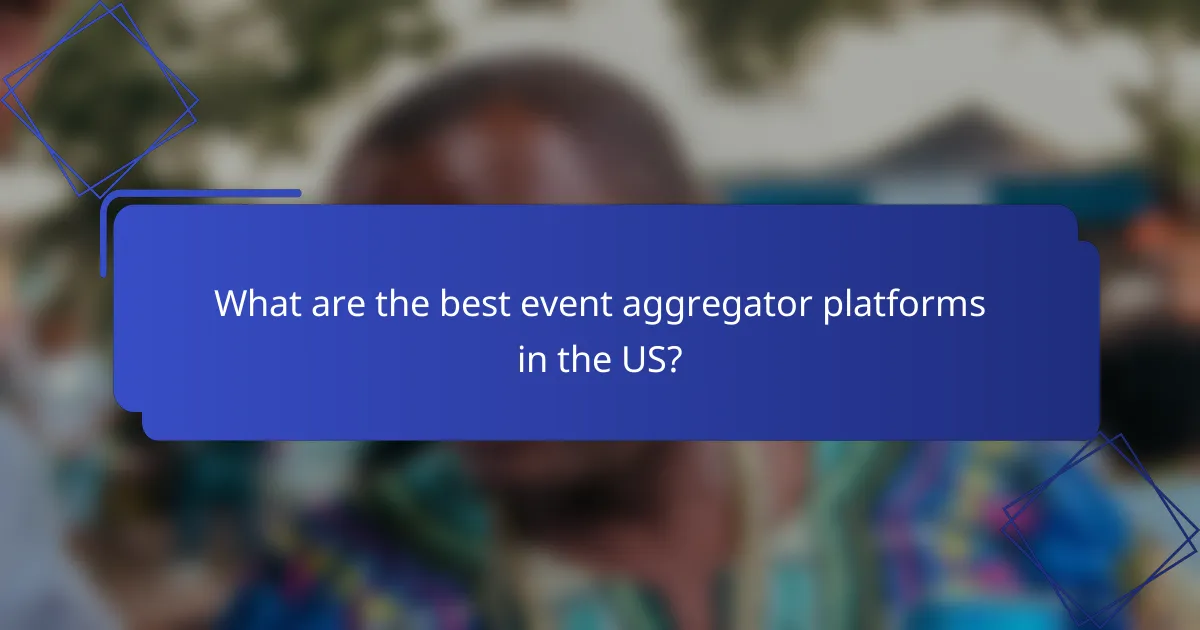
What are the best event aggregator platforms in the US?
The best event aggregator platforms in the US include Eventbrite, Meetup, Facebook Events, Ticketmaster, and Eventful. These platforms help users discover, promote, and manage events across various categories, making it easier to find local happenings or share events with a wider audience.
Eventbrite
Eventbrite is a leading platform for event management and ticketing, allowing users to create, promote, and sell tickets for events. It caters to a wide range of events, from concerts to workshops, and offers features like customizable event pages and promotional tools.
When using Eventbrite, consider its fee structure, which typically includes a percentage of ticket sales plus a flat fee per ticket. This can add up, especially for free events, so be sure to weigh the costs against the potential reach and benefits.
Meetup
Meetup focuses on building communities around shared interests, making it ideal for social gatherings, networking events, and hobby groups. Users can create groups based on specific topics and organize events that foster engagement among members.
To maximize your Meetup experience, ensure your group is active and regularly hosts events. This will help maintain member interest and encourage attendance. Keep in mind that Meetup charges a subscription fee for group organizers, which can vary based on the plan selected.
Facebook Events
Facebook Events allows users to create and promote events directly through their Facebook profiles or pages. This platform leverages the extensive user base of Facebook, making it easy to reach a large audience and invite friends.
Utilize Facebook Events by sharing engaging content and encouraging attendees to RSVP. However, be aware that the visibility of your event may depend on Facebook’s algorithms, so consider promoting your event through paid ads for better reach.
Ticketmaster
Ticketmaster is a major player in the ticketing industry, specializing in large-scale events such as concerts, sports, and theater. It provides a robust platform for purchasing tickets and offers features like mobile ticketing and event alerts.
When using Ticketmaster, be mindful of service fees that can significantly increase ticket prices. Additionally, popular events may sell out quickly, so it’s advisable to act fast and set alerts for ticket releases.
Eventful
Eventful is an event discovery platform that allows users to find local events, concerts, and activities based on their interests. It features a user-friendly interface and provides personalized recommendations based on location and preferences.
To make the most of Eventful, regularly check for updates and new events in your area. The platform also allows users to follow their favorite venues and artists, ensuring you stay informed about upcoming happenings.
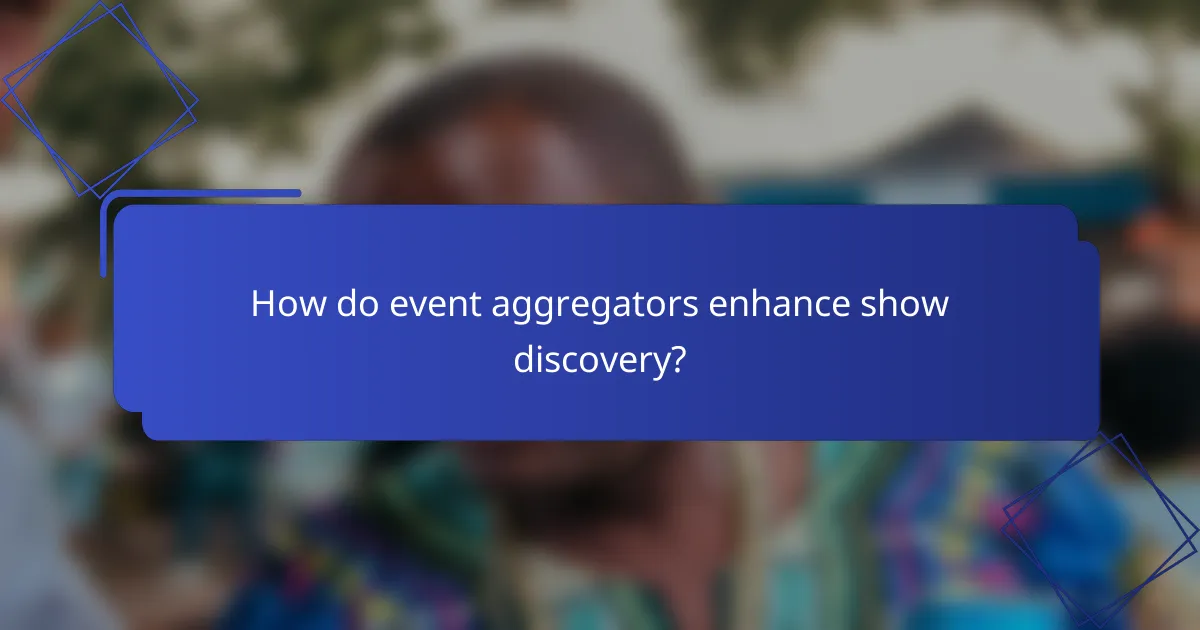
How do event aggregators enhance show discovery?
Event aggregators improve show discovery by consolidating various events into a single platform, making it easier for users to find and explore options. They provide essential features like comprehensive listings, user reviews, and personalized recommendations to enhance the overall experience.
Comprehensive listings
Comprehensive listings are a key feature of event aggregators, allowing users to view a wide array of shows and events in one place. These platforms often categorize events by type, location, and date, making it simple to filter options that match user preferences.
For instance, a user searching for music concerts in New York City can find events ranging from small local gigs to large arena shows. This breadth of information helps users discover new experiences they might not have encountered otherwise.
User reviews and ratings
User reviews and ratings play a crucial role in helping individuals make informed decisions about which shows to attend. Aggregators typically allow attendees to leave feedback, which can guide potential viewers in assessing the quality and appeal of an event.
For example, a show with consistently high ratings and positive reviews may indicate a worthwhile experience, while lower-rated events could be approached with caution. This feedback mechanism encourages event organizers to maintain high standards and improve their offerings.
Personalized recommendations
Personalized recommendations enhance the show discovery process by tailoring suggestions based on user behavior and preferences. Event aggregators analyze past attendance, searches, and ratings to present users with events they are likely to enjoy.
For instance, if a user frequently attends comedy shows, the platform may highlight upcoming performances by similar artists or in related genres. This customization not only saves time but also enriches the user’s experience by connecting them with events that align with their interests.
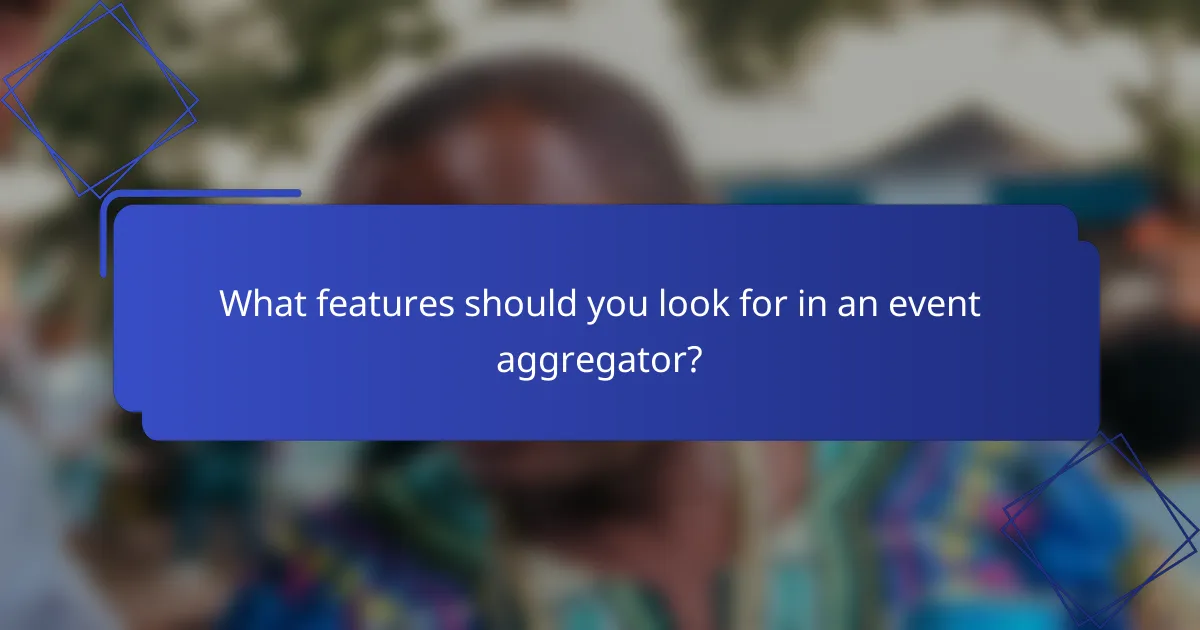
What features should you look for in an event aggregator?
When selecting an event aggregator, prioritize features that enhance your ability to discover and manage events effectively. Key aspects include robust search filters, mobile accessibility, social media integration, and convenient ticket purchasing options.
Search filters
Search filters are essential for narrowing down event choices based on specific criteria such as date, location, category, and price range. Effective filters help users quickly find relevant events that match their interests and schedules.
Look for aggregators that offer multiple filtering options, enabling you to customize your search experience. For example, you might want to filter by family-friendly events or those occurring within a certain radius of your location.
Mobile accessibility
Mobile accessibility ensures that you can browse and manage events on-the-go. A well-designed mobile interface or dedicated app allows users to access event information anytime, anywhere.
Check if the aggregator provides a responsive design that adapts to various screen sizes. This feature is crucial for users who rely on smartphones or tablets for event discovery and ticket purchases.
Social media integration
Social media integration allows users to share events easily and connect with friends. Look for platforms that enable sharing via popular networks like Facebook, Twitter, and Instagram.
This feature not only enhances personal engagement but also helps in discovering events that friends are attending, making it easier to coordinate plans together.
Ticket purchasing options
Convenient ticket purchasing options streamline the process of securing your spot at an event. Aggregators should offer various payment methods, including credit cards, PayPal, and mobile wallets.
Consider platforms that provide direct links to ticket sales or integrate with ticketing services. This can save time and reduce the hassle of navigating multiple sites to complete a purchase.
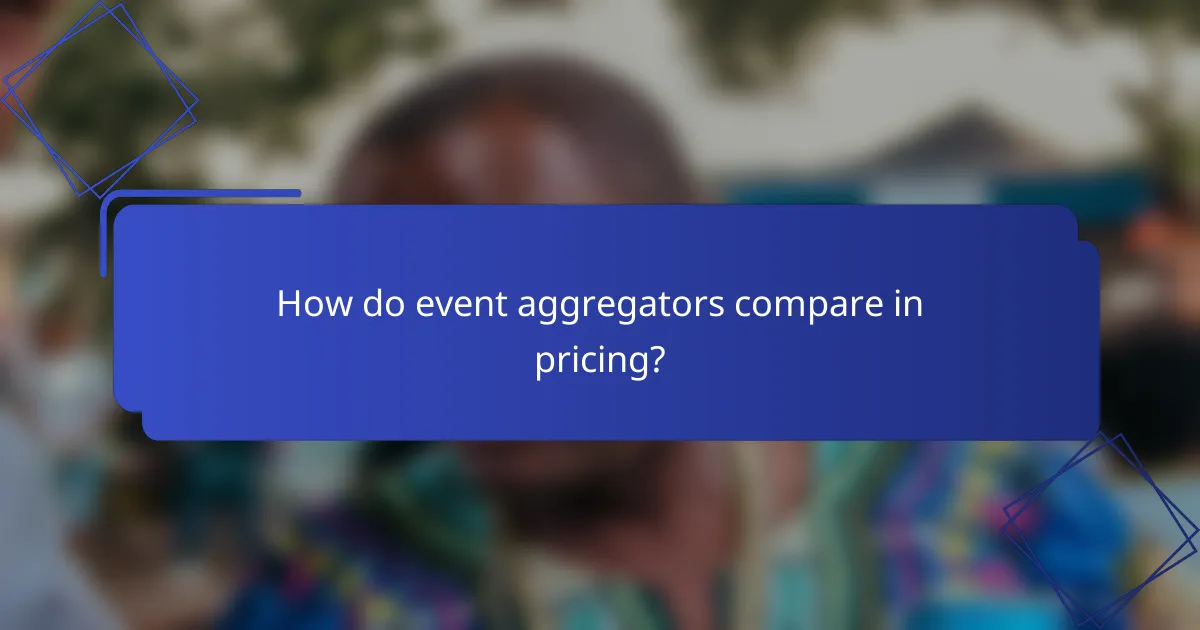
How do event aggregators compare in pricing?
Event aggregators vary significantly in pricing models, which can impact how event organizers choose to promote their events. Understanding the differences in free versus paid listings, commission structures, and subscription models is essential for making informed decisions.
Free vs. paid listings
Many event aggregators offer both free and paid listing options. Free listings typically provide basic visibility but may limit features such as promotional tools or enhanced visibility on the platform. Paid listings often come with additional benefits, such as priority placement and access to analytics, which can lead to higher attendance rates.
When considering whether to opt for a free or paid listing, evaluate your budget and the potential return on investment. For instance, if you are hosting a large event, investing in a paid listing may yield better results compared to a free option.
Commission structures
Commission structures can vary widely among event aggregators, with some charging a flat fee per ticket sold while others take a percentage of the total sales. Typically, commission rates range from 5% to 15%, depending on the platform and the services provided.
It’s crucial to read the fine print regarding commission fees, as they can significantly affect your overall revenue. For example, if you are selling tickets for a high-priced event, even a small percentage can add up to a substantial amount.
Subscription models
Some event aggregators operate on a subscription model, where organizers pay a monthly or annual fee for access to the platform’s features. This can be beneficial for those who frequently host events, as it often includes unlimited listings and additional promotional tools.
When evaluating subscription options, consider the frequency of your events and the potential cost savings. If you plan to list multiple events throughout the year, a subscription might be more economical than paying per listing or ticket sold.
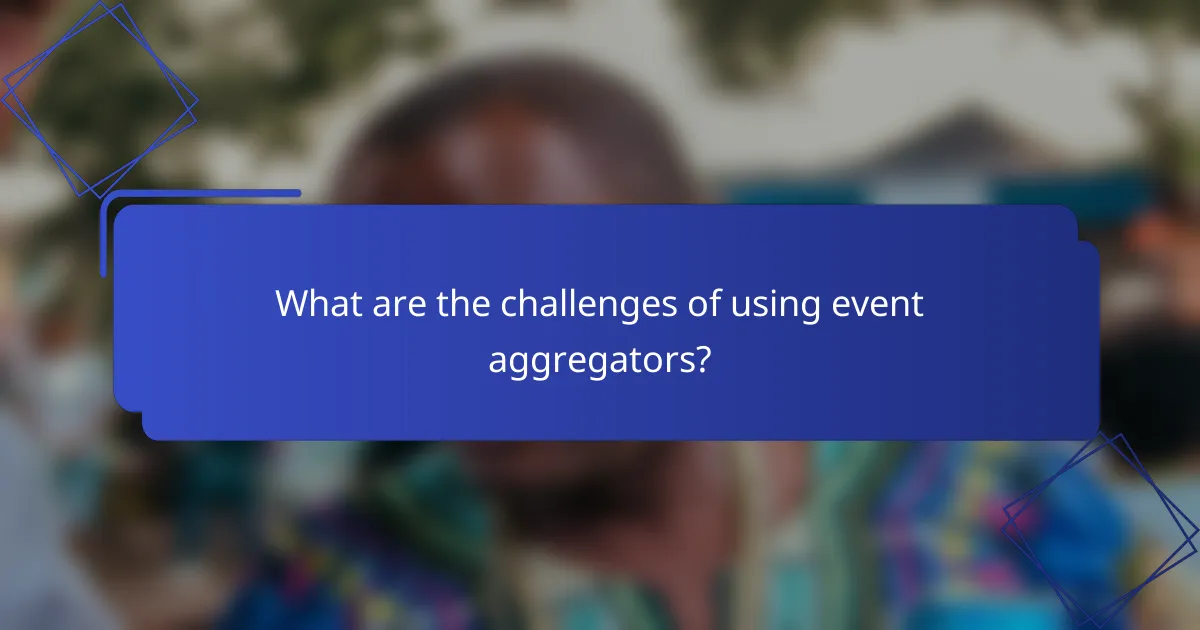
What are the challenges of using event aggregators?
Event aggregators can present several challenges, including issues with data accuracy, event saturation, and limited local coverage. These factors can affect the user experience and the effectiveness of discovering relevant events.
Data accuracy
Data accuracy is a significant challenge for event aggregators, as the information provided may not always be up-to-date or reliable. Users may encounter outdated event details, such as incorrect dates, times, or locations, which can lead to frustration and missed opportunities.
To mitigate this issue, it is essential to choose platforms that prioritize data verification and regularly update their listings. Look for aggregators that source information directly from event organizers or official channels to enhance reliability.
Event saturation
Event saturation occurs when an aggregator lists too many events, making it difficult for users to find what they are genuinely interested in. This overwhelming amount of information can dilute the visibility of smaller or niche events, causing them to be overlooked.
To navigate event saturation, users should utilize filtering options and personalized recommendations offered by aggregators. Focusing on specific categories or interests can help streamline the search process and enhance the overall experience.
Limited local coverage
Limited local coverage is another challenge faced by event aggregators, particularly in less populated areas or regions with fewer events. Users in these locales may find that their options are restricted, leading to a less satisfying event discovery experience.
To address this limitation, consider using multiple aggregators that cater to different regions or specialize in local events. Engaging with community boards or local social media groups can also provide insights into events that may not be listed on larger platforms.
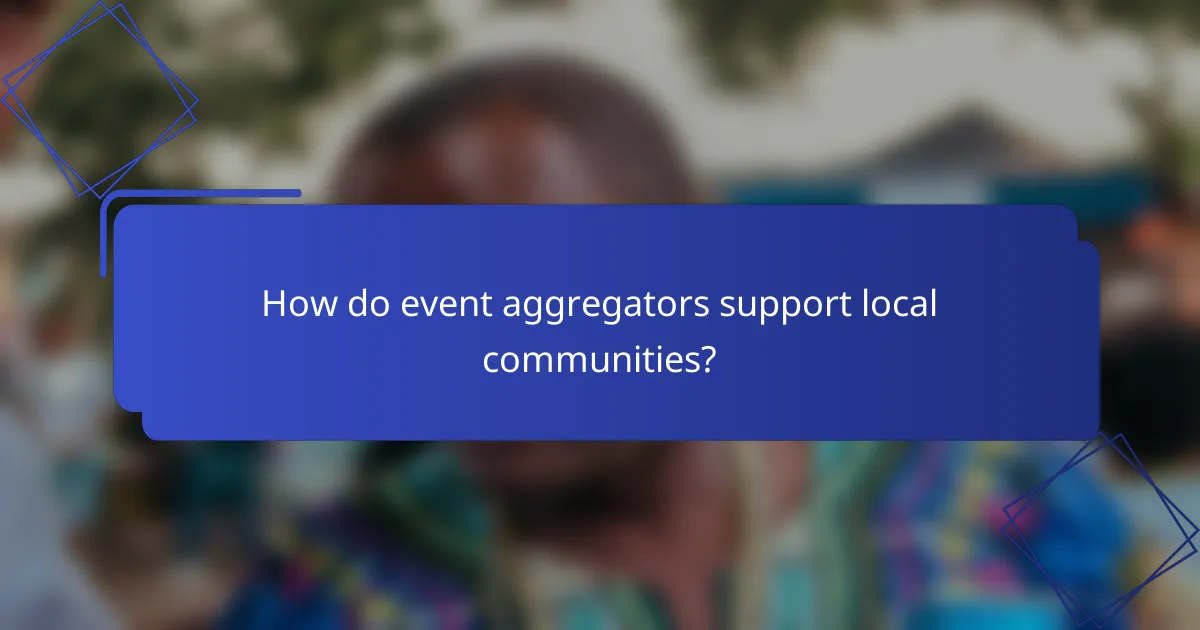
How do event aggregators support local communities?
Event aggregators play a vital role in supporting local communities by providing a centralized platform for discovering and promoting events. They connect residents with local happenings, enhancing community engagement and participation.
Connecting Local Events with Audiences
Event aggregators gather information about various local events, such as concerts, festivals, and workshops, making it easier for audiences to find activities that interest them. By compiling listings from multiple sources, these platforms ensure that users have access to a comprehensive view of what’s happening in their area.
For example, a resident in Sofia can use an event aggregator to discover everything from art exhibitions to food markets happening that weekend. This accessibility encourages greater participation and fosters a sense of community.
Promoting Local Businesses and Artists
Event aggregators often feature local businesses and artists, providing them with a platform to reach wider audiences. By promoting events hosted by these entities, aggregators help stimulate the local economy and support creative talent.
For instance, a small café in Plovdiv can list its live music nights on an aggregator, attracting more customers and promoting local musicians. This symbiotic relationship benefits both the businesses and the community.
Facilitating Community Engagement
By offering a variety of events, aggregators encourage community members to engage with one another and participate in local culture. They often include features like user reviews and ratings, which help individuals make informed decisions about which events to attend.
Additionally, many platforms allow users to share events on social media, further amplifying community involvement. This sharing can lead to increased attendance and a stronger sense of belonging among residents.
